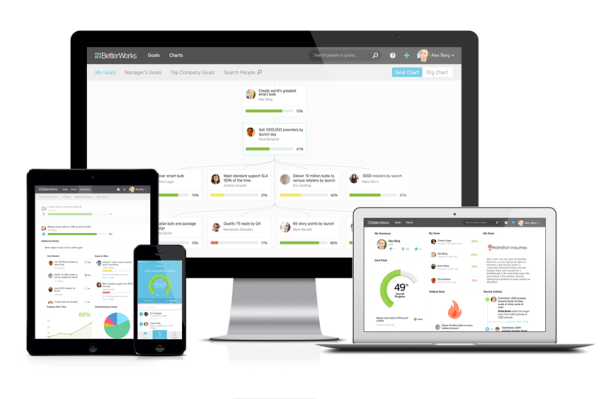BetterWorks, a new, cloud-based platform designed to help employees set and reach business goals — and the newest project from gamification pioneer Kris Duggan of Badgeville — is coming out of stealth today, as the startup of the same name announces that it has reached some goals of its own.
It has raised $15.5 million from a group of top investors; and it has picked up 25 enterprise customers, while in stealth, and in the words of Duggan expects to pass “substantial seven figures in sales in revenue this year.”
The round is led by John Doerr and Bing Gordon of Kleiner Perkins Caufield & Byers, and others investing include Palantir’s Joe Lonsdale (via Formation 8).
Doerr’s involvement with BetterWorks is more than just that of a VC whose interest has been piqued by a catchy idea: while at Intel, he was involved in some of the early efforts being made by large companies to figure out ways of harnessing people’s ambitions and tying them to more organised productivity.
Later, as a board member at Google, he was also instrumental in getting some of these ideas implemented there, alongside Shona Brown, a Googler Emeritus who used to help run operations at the company. Brown, along with Doer, Gordon, Lonsdale and Jason Lemkin, former VP of Adobe and CEO of EchoSign, are all joining BetterWorks’ board.
Duggan, who left Badgeville about a year ago (after an initial transition from CEO to CSO), has been working on BetterWorks for the better part of a year with co-founders Di Wu (ex-Palantir engineering) and Paul Reeves (another Badgeville alum who headed up customer success).
It is a product of some of the issues Duggan was encountering in the companies where he himself worked. When you are around a lot of smart people, how do you keep them creative and motivated but also focused on growing the business at hand at the same time?
While there is clearly a connection between gamification for consumers and goal-setting for employees — they are, at heart, about people identifying motivations and a company using those to encourage certain actions — Duggan says that BetterWorks is miles away from Badgeville and could not have been built there.
“The inspiration for our dashboard and this product, in a way, is the concept of a Fitbit for work,” he told me in an interview. In other words, it’s the concept of quantified self, regular monitoring made engaging and encouraging — something you can see in BetterWorks’ dashboard.
“This isn’t HR software. Most HR companies aren’t thinking of operations. But this is not about performance reviews and all that stuff,” he says. Indeed, you are given a couple of ways of using the platform — both to set specific goals and meet them, or to see how you progress incrementally, based around a timeframe that you give yourself to achieve your goal.
The concept is inherently social — you share your goals with team members by default, unless you set them to private, and you invite others along to participate if they are team efforts, so that they become everyone’s objectives.
And in a hat-tip to platform plays and other more incumbent HR software, BetterWorks integrates with a lot of APIs for produts like Asana and Salesforce, should you want that data to link up together — with the long-term goal being to integrate all kinds of workflow and productivity apps.
There has been some evidence that this is working. The 25 companies have collectively already posted some 20,000 goals and achievement milestones since joining the platform. All while paying BetterWorks for the privilege.
The BetterWorks platform is inspired by something called the OKR model (which stands for Objectives and Key Results), first put in place by Doerr at Intel. “Ideas are relatively easy, but execution is everything,” Doerr says in a statement.
Ironically, Duggan had already created the platform and business prior to meeting Doerr or even knowing about his connection to the concept. Bing Gordon is a mutual friend, and when Duggan got in touch to say he wanted to talk about his new product with him, Gordon came up with the idea of connecting the two, who hit it off.
BetterWorks, which is charged on a $15 per user, per month model, comes down in price on volume discounts starting at 500 users — a sign of the company’s ambitions in terms of how it plans to scale.
For now, it’s not disclosing all of its customers but has a few recognisable names that are worth pointing out. They include Zynga (per the Gordon and Doerr connection) and the U.S. Department of Health and Human Services. Duggan says there are others that he cannot disclose “yet.”
Although Google’s in-house-designed goals platform is, in Duggan’s words, “light years” behind BetterWorks, he’s not fazed about whether it might ever become a competitor if Google decides to productise it in an enterprise push.
What he is keen to do is land Google as a customer. “One of our stretch goals is to get Google to use our product internally,” he says. “We are not at 100% on that goal just yet, but Doerr is on the boards of Google and BetterWorks so there is not going to be a competitive scenario there. That is extremely unlikely.”
